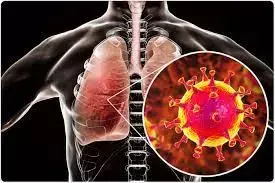- Home
- Medical news & Guidelines
- Anesthesiology
- Cardiology and CTVS
- Critical Care
- Dentistry
- Dermatology
- Diabetes and Endocrinology
- ENT
- Gastroenterology
- Medicine
- Nephrology
- Neurology
- Obstretics-Gynaecology
- Oncology
- Ophthalmology
- Orthopaedics
- Pediatrics-Neonatology
- Psychiatry
- Pulmonology
- Radiology
- Surgery
- Urology
- Laboratory Medicine
- Diet
- Nursing
- Paramedical
- Physiotherapy
- Health news
- Fact Check
- Bone Health Fact Check
- Brain Health Fact Check
- Cancer Related Fact Check
- Child Care Fact Check
- Dental and oral health fact check
- Diabetes and metabolic health fact check
- Diet and Nutrition Fact Check
- Eye and ENT Care Fact Check
- Fitness fact check
- Gut health fact check
- Heart health fact check
- Kidney health fact check
- Medical education fact check
- Men's health fact check
- Respiratory fact check
- Skin and hair care fact check
- Vaccine and Immunization fact check
- Women's health fact check
- AYUSH
- State News
- Andaman and Nicobar Islands
- Andhra Pradesh
- Arunachal Pradesh
- Assam
- Bihar
- Chandigarh
- Chattisgarh
- Dadra and Nagar Haveli
- Daman and Diu
- Delhi
- Goa
- Gujarat
- Haryana
- Himachal Pradesh
- Jammu & Kashmir
- Jharkhand
- Karnataka
- Kerala
- Ladakh
- Lakshadweep
- Madhya Pradesh
- Maharashtra
- Manipur
- Meghalaya
- Mizoram
- Nagaland
- Odisha
- Puducherry
- Punjab
- Rajasthan
- Sikkim
- Tamil Nadu
- Telangana
- Tripura
- Uttar Pradesh
- Uttrakhand
- West Bengal
- Medical Education
- Industry
Severity of diabetes tied to worsening of lung cancer: Study

More severe diabetes may worsen lung cancer prognosis according to a recent study published in the Cancers (Basel)
The survival impact of diabetes severity on lung cancer remains unclear. They performed head-to-head propensity score matching to estimate the survival impact of various adapted diabetes complications severity index (aDCSI) scores in patients with both diabetes and lung squamous cell carcinoma (SqCLC).
They enrolled patients with both diabetes and lung SqCLC and categorized them into the mild (aDCSI = 0-1) and moderate-to-severe (aDCSI ≥ 2) diabetes groups. The patients in both groups were matched at a 1:1 ratio.
Results:
- the matching process yielded a final cohort of 5742 patients with both diabetes and lung SqCLC (2871 patients in the mild diabetes group and 2871 patients in the moderate-to-severe diabetes groups) who were eligible for further analysis.
- A multivariate Cox regression analysis revealed that the adjusted hazard ratio (aHR; 95% confidence interval) of all-cause death for the mild diabetes group relative to the moderate-to-severe diabetes group was 1.17
Thus, severe diabetes (aDCSI ≥ 2) is an independent prognostic factor for OS among patients with both diabetes and lung SqCLC who receive standard treatments. Preventing diabetes progression is necessary for patients with diabetes because it not only supports diabetes control but also improves survival for patients with lung SqCLC.
Reference:
Association of Diabetes Severity and Mortality with Lung Squamous Cell Carcinoma by Chih-Hsiung Su et al. published in the Cancers (Basel)
DOI: 10.3390/cancers14102553
Keywords:
More, severe, diabetes, worsen, lung, cancer, prognosis, lung cancer; propensity scores matching; severity of diabetes; squamous cell carcinoma; survival, Cancers (Basel)
Dr. Shravani Dali has completed her BDS from Pravara institute of medical sciences, loni. Following which she extensively worked in the healthcare sector for 2+ years. She has been actively involved in writing blogs in field of health and wellness. Currently she is pursuing her Masters of public health-health administration from Tata institute of social sciences. She can be contacted at editorial@medicaldialogues.in.
Dr Kamal Kant Kohli-MBBS, DTCD- a chest specialist with more than 30 years of practice and a flair for writing clinical articles, Dr Kamal Kant Kohli joined Medical Dialogues as a Chief Editor of Medical News. Besides writing articles, as an editor, he proofreads and verifies all the medical content published on Medical Dialogues including those coming from journals, studies,medical conferences,guidelines etc. Email: drkohli@medicaldialogues.in. Contact no. 011-43720751


